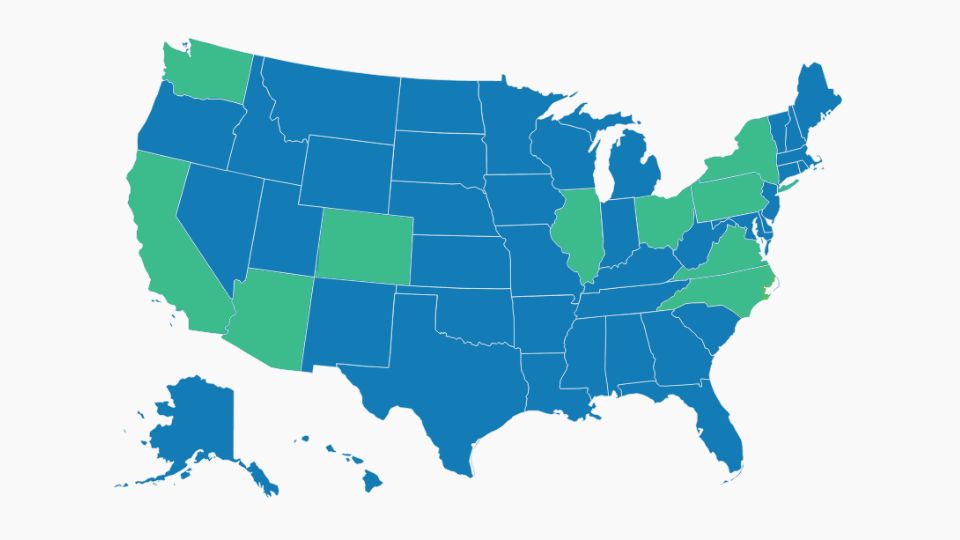House rentals play a significant role in the lives of many people. Tenant rights rules vary significantly from state to state. Some states offer additional legal protections for tenants. This article will explore the top 10 states that are most tenant-friendly.
Top 10 Tenant Friendly States
1) California
California has tenant-friendly laws. The state ensures protection from unjust evictions and guarantees access to safe housing. Rent control in certain areas can prevent steep rent hikes, providing tenants with stability.
The Tenant Protection Act of 2019 imposes restrictions on rent hikes and landlord activities for eligible homes constructed prior to 2005. This law provides California tenants with increased stability and the ability to more accurately anticipate changes in rent.vCalifornia has stringent regulations concerning security deposits to prevent landlords from unjustly keeping deposits without proper justification.
2) The Big Apple
New York, especially in places like New York City, offers strong tenant protections. Rent stabilization laws restrict the extent to which landlords can raise rent for rent-stabilized apartments, ensuring affordability for tenants.
Governor Andrew Cuomo signed the Housing Stability and Tenant Protection Act in June 2019, altering the landlord-tenant law in New York. This legislation establishes boundaries for security deposits, guarantees tenants are given receipts, and offers safeguards during eviction processes.
The state has robust laws in place to prevent retaliatory evictions, allowing tenants to freely exercise their rights. In addition, New York allows tenants to come together and negotiate for improved living conditions.
3) Oregon
Oregon is known for its progressive stance on tenant rights. Rent control measures have been put in place by the state, capping annual rent increases to a specific percentage. In 2019, Oregon became the inaugural state to enforce rent control across the entire state.
Moreover, Oregon enforces stringent rules on the eviction process, ensuring that tenants receive sufficient notice and chances to address lease violations before being evicted. Oregon’s tenant protections also cover discrimination based on income sources, including housing vouchers.
4) Washington
Washington state has established robust tenant protections to ensure a fair and equitable rental market. Washington D.C. has the second-highest property prices in the country, leading landlords to follow strict tenant protections. One important aspect is giving tenants a minimum of 48 hours notice before accessing the property, which enhances privacy and security for renters in the capital.
5) Massachusetts
Massachusetts has strong laws in place to protect tenants from unfair evictions. Landlords are required to provide a valid reason, like non-payment of rent or lease violations, in order to terminate a tenancy due to the state’s “just cause” eviction policy.
In addition, Massachusetts has implemented a Rental Discrimination Testing Program to combat discrimination against tenants due to race, gender, or other protected characteristics. The state’s commitment to fair housing practices guarantees a fair rental experience for everyone.
Also Read: 3 Washington Cities Crawling With Most Infested Bed Bugs
6) Colorado
Colorado has laws that protect tenants by requiring landlords to ensure safe and livable living conditions. Landlords in the state are prohibited from taking retaliatory actions against tenants who assert their rights, ensuring a safe environment for renters.
Furthermore, Colorado legislation prevents excessively high late fees, offering tenants additional financial security. The state’s dedication to affordable housing is evident in its initiatives to control rental rates and guarantee housing stability for residents.
7) Minnesota
Minnesota has thorough regulations in place regarding security deposits. Landlords must refund deposits within three weeks of a tenant leaving, and they must provide a detailed list of any deductions made.
Moreover, in Minnesota, tenants are given a grace period for rent payments, allowing them a reasonable timeframe before incurring late fees. The state’s stringent guidelines regarding eviction processes and tenant remedies help maintain a fair and favorable rental market for tenants.
8) Vermont
Vermont has introduced creative solutions to tackle homelessness by providing financial rewards to landlords who join the state’s “Housing First” initiative.
This program is designed to offer secure housing for people who are homeless, demonstrating Vermont’s dedication to tackling larger social issues through initiatives that prioritize tenants.
The state enforces strict rent control laws, which restrict rent hikes and encourage affordable housing choices for residents.
9) Hawaii
The rental scene in Hawaii is influenced by the Landlord-Tenant Code, which sets out clear guidelines for landlords and tenants in a rental contract. Landlords are required by the state to give tenants a written disclosure outlining their rights and responsibilities to promote transparency from the beginning.
In Hawaii, landlords must provide tenants with a minimum of two days’ notice before entering rental units, as per strict guidelines. Hawaii offers a great example of legislation that prioritizes clear communication and tenant privacy.
10) New Jersey
New Jersey is among the most tenant-friendly states. The state has laws in place that favor tenants by limiting landlords from implementing excessive rent hikes. When it comes to lease renewals, New Jersey is considered the most favorable state for tenants in the United States. Property taxes in this area are quite steep.
New Jersey offers robust safeguards to protect tenants from retaliatory actions by landlords when they assert their rights. Landlords are required by state laws to maintain safe and sanitary living conditions.



Leave a Reply